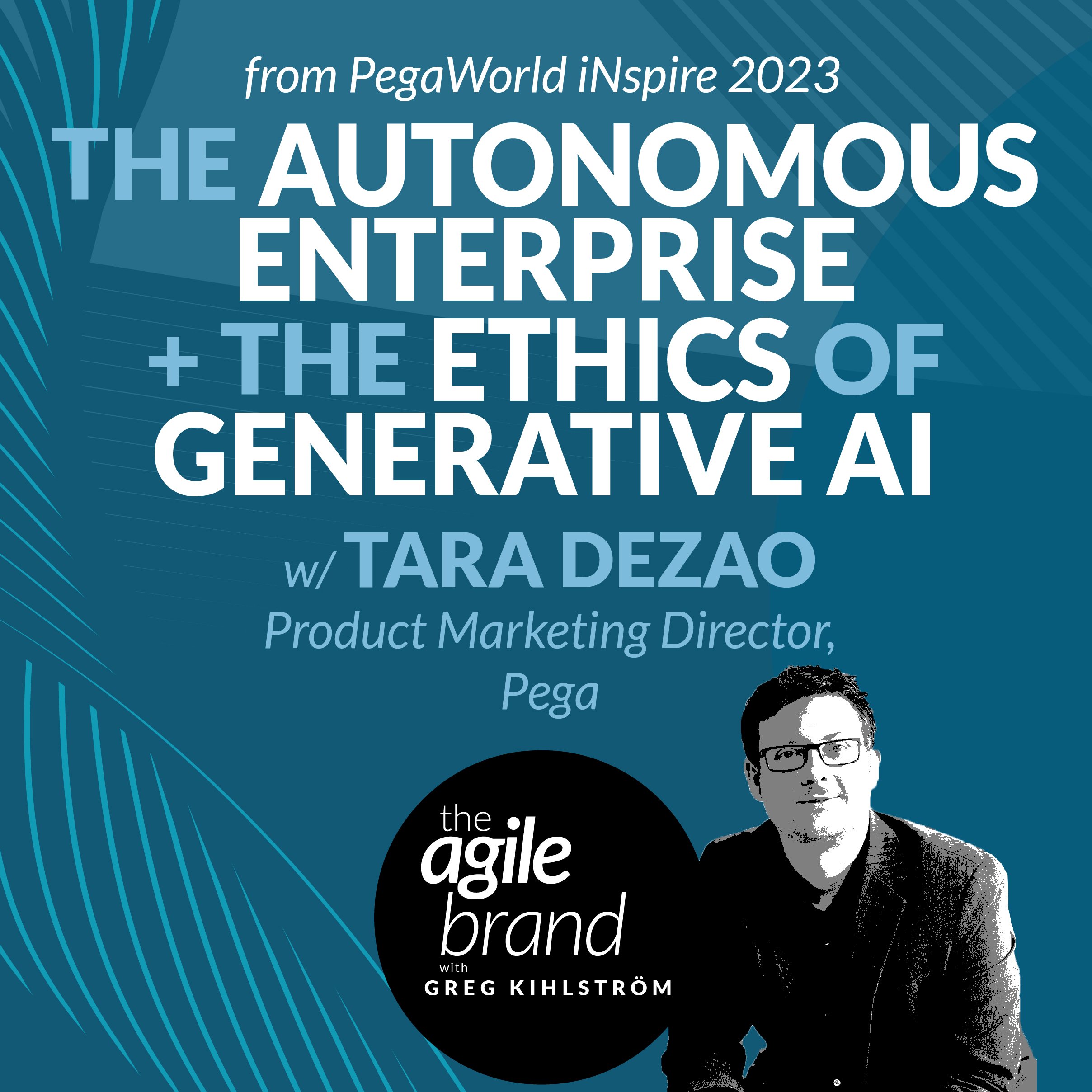S5 | 384: The Autonomous Enterprise and CX, plus the Ethics of Generative AI, with Tara DeZao, Pega
About the Episode
The following episode was recorded at PegaWorld Inspire in Las Vegas, and I’m looking forward to this topic as well as sharing the conversation with my guest today.
Today we’re going to talk about the Autonomous Enterprise and how it benefits the customer experience as well as the business, plus the ethics of generative AI.
To help me discuss this topic, I am joined by Tara DeZao, Product Marketing Director, AdTech and MarTech.
Resources
Pega: https://www.pega.com
The Agile Brand podcast website: https://www.gregkihlstrom.com/theagilebrandpodcast
Sign up for The Agile Brand newsletter here: https://www.gregkihlstrom.com
Get the latest news and updates on LinkedIn here: https://www.linkedin.com/company/the-agile-brand/
For consulting on marketing technology, customer experience, and more visit GK5A: https://www.gk5a.com The Agile Brand podcast is brought to you by TEKsystems.Learn more here: https://www.teksystems.com/versionnextnow
The Agile Brand is produced by Missing Link—a Latina-owned strategy-driven, creatively fueled production co-op. From ideation to creation, they craft human connections through intelligent, engaging and informative content. https://www.missinglink.company
Synopsis
Understanding bias is a crucial aspect of utilizing AI, as mentioned in the episode transcript. It is essential for anyone using AI to have a clear comprehension of bias and its potential impact. Bias can be introduced through the data used to train AI models. For instance, if the data used to train a chatbot only covers up to 2021, any information or events that occurred after that time will be excluded from the dataset. This outdated data can result in biased decision-making based on information that may no longer hold true.
The episode also highlights that bias in AI is not always intentional or malicious. Machine learning algorithms are designed to learn from the data they are trained on, and if that data contains biases, the algorithm will reinforce those biases. This can lead to incorrect and biased outcomes.
To address bias in AI, it is crucial to have human oversight and mediation. Ensuring ethical behavior in AI systems is not solely the responsibility of technical staff and data scientists. Various roles across a company contribute to how AI tools are used, and it is incumbent upon everyone to collaborate in creating a bias-free world in AI. This can involve partnering with competitors and establishing frameworks that outline ethical guidelines for AI usage. Additionally, it is important for the entire workforce to be aware of and vigilant in identifying biases in AI systems.
In the episode, the speakers discuss the significance of maintaining up-to-date data sets to avoid biased decision-making. They emphasize that when data is outdated, decisions may be based on information that is no longer accurate. They provide an example of interactions between customer engagement practitioners and clients, such as applying for a mortgage or a credit card, where gender bias and other biases have been observed in outdated data sets. The speakers stress the need for oversight to ensure that data does not contain biases.
They also mention that algorithms are simply sets of instructions, and their outcomes depend on the intent and data behind them. They explain that machine learning, while remarkable, can be led astray if the data it is trained on is biased or outdated. The speakers acknowledge that even if biases are not introduced for malicious purposes, they can still have negative consequences.
Overall, the episode highlights the importance of having up-to-date data sets to avoid biased decision-making and ensure that machine learning algorithms are guided in the right direction.
According to the podcast transcript, AI can contribute to better outcomes and enhance business processes by enabling self-learning and automation. The speaker mentions that when AI is self-learning across all channels and departments, it can lead to improved outcomes. For example, AI can be utilized for process workflow automation to identify and resolve bottlenecks. This can help businesses maintain smooth operations and scale effectively. The speaker also emphasizes the goal of establishing a partnership between humans and AI, rather than relying solely on AI. The use of AI in the autonomous enterprise aims to reduce friction and enhance both the client and employee experience.
Tara DeZao, Product Marketing Director, AdTech and MarTech, Pegasystems


